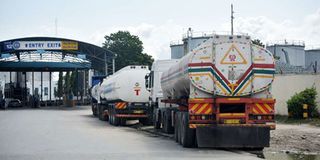Prime
Fuel crisis: End pocket- to-mouth economy

Oil tankers parked outside the Port of Mombasa. PHOTO | KEVIN ODIT | NMG
What you need to know:
- The issue: Planning
- Our view: Fast-forward and nothing has changed. The government is the same. The crisis the same. The commentaries the same. The promises the same. The fuel reserves the same... Basically, everything, including in Parliament, where legislators grilled Finance ministry officials on failure to
- plan for such emergencies.
When the coronavirus pandemic visited upon the country in March 2020, there were several talks around planning for such emergencies because the virus had aught the government flat-footed.
To the surprise of all, when the second wave of the virus hit more than a year later, there was still no contingency plan in place. All the donations amassed during the on- set of Covid-19 were merely lingering scandals waiting to blow up.
Suddenly, fuel pump prices have shot up. There had been a similar situation during the pandemic when trucks rambling across the borders with goods and services were affected by Covid-19 restrictions. And there have been many other similar scenarios when Uganda’s Achilles heel left the economy on its knees due to a fu- el crisis.
When the political crisis in Kenya in 2007 left Uganda naked and yawning with bread and sugar selling for the price of a kidney, so many promises were made that hinged on the government’s ability to plan and execute. Everyone got to learn about fuel reserves in the country and what they actually cannot accomplish, ever.
Fast-forward and nothing has changed. The government is the same. The crisis the same. The commentaries the same. The promises the same. The fuel reserves the same... Basically ,everything, including in Parliament, where legislators grilled Finance ministry officials on failure to plan for such emergencies.
The country as it is remains a hand- to-mouth economy. The majority of the citizens work hand-to-mouth whether on their farms or in corporate offices.
But like the regimes the NRM en- gaged failed because of lack of planning, it’s high time the government realised that it cannot just keep waking up to the same failings.Without a functional national fuel reserve capable of withstanding weeks of emergency, the economy is always a disaster in the pipeline. Those tasked with running the economy must plan for it now.




